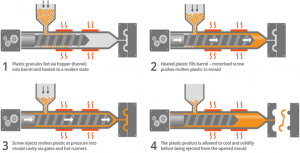We will cover everything you need to know about injector pins: from what they are and why they matter to signs of faulty injector pins and tools required for replacement. We have also provided a step-by-step guide for replacing faulty injector pins, so you can master the art of injector pin replacement and keep your engine running at its best.
Understanding Injector Pin Replacement:
Injector pins are an essential component in the fuel system of diesel engines. Over time, injector pins can wear out due to factors like high mileage or poor maintenance. Signs of a worn-out injector pin include poor engine performance and reduced fuel efficiency. Replacing injector pins requires specialized tools and knowledge, making it best left to professional mechanics.
Regular maintenance and inspection of injector pins can help prevent premature failure and save on costly repairs. Understanding the components of your diesel engine can help you identify potential problems early on and address them before they become more serious. If you suspect that your injector pins are worn out, be sure to have them inspected by a qualified mechanic as soon as possible.
What is Injector Pin Replacement?
Injector pins are small metal components that play a crucial role in the fuel injection process of an engine. They are responsible for injecting fuel into the combustion chamber at precise intervals, which is essential for proper engine performance.
Over time, injector pins can wear out and need to be replaced to ensure that the engine operates at its best. Replacing injector pins can be complex, but with the right tools and knowledge, it can be done efficiently and effectively.
It’s important to follow a step-by-step guide when replacing injector pins to avoid damaging other engine components. With proper care and attention, replacing injector pins can help keep your engine running smoothly for years to come.
Importance of Injector Pins in Engine Performance:
Injector pins are a crucial component in the fuel injection process of an engine. They are responsible for controlling the flow of fuel into the engine cylinders, which is essential for proper combustion and maximum power output. As such, injector pins play an important role in overall engine performance.
Worn or damaged injector pins can cause a range of issues, including misfires, reduced fuel efficiency, and potentially even engine damage. That’s why it’s important to replace them as soon as they begin to show signs of wear.
Replacing injector pins requires careful attention to detail and following specific steps to ensure proper installation. By mastering this process, you can improve your engine’s performance and avoid costly repairs down the road. With proper maintenance and care, your engine will be running smoothly for years to come.
Click Here to Read Part 2nd
Common Causes of Injector Pin Failure:
Injector pin replacement are small but crucial components that play a vital role in the fuel injection process of an engine. They are responsible for delivering fuel to the combustion chamber at the right time and in the right amount. Common causes of injector pin failure include wear and tear, corrosion, and contamination.
Injector Pin Replacement can improve the performance and efficiency of your engine while also saving you money on fuel costs. It’s important to choose high-quality replacement pins that are compatible with your engine make and model. Following a step-by-step guide and using the right tools can make the injector pin replacement easier and more efficient.
By understanding injector pins and common causes of failure, you can take steps to prevent issues before they occur. Regular maintenance and inspections can help ensure that your engine runs smoothly and efficiently, without any issues related to injector pins or other components.
Signs of Faulty Injector Pins:
A faulty injector pin can have a significant impact on your engine’s performance. Signs of a bad injector pin include loss of power and acceleration, rough idling or engine misfires, increased fuel consumption, smoke or unusual emissions from the exhaust, or check engine light illuminating on the dashboard. The physical signs of damage or wear include corrosion or cracks.
If you notice any of these symptoms, it is important to address them promptly to prevent further damage to your vehicle’s engine. Replacing injector pins requires precision and attention to detail, which is why it is recommended to seek professional help for this task. With the right tools and knowledge, however, anyone can master the art of injector pin replacement using this step-by-step guide.
 Injection Molding Ejection System: Where to Use Ejector Pins and How to Design Ejection System
Injection Molding Ejection System: Where to Use Ejector Pins and How to Design Ejection System  A Step-by-Step Guide to the Injection Molding Process
A Step-by-Step Guide to the Injection Molding Process  Mastering the Basics of the Two Color Injection Molding Process
Mastering the Basics of the Two Color Injection Molding Process  Plastic Injection Mold Material Guide – Advantages & Applications Of 20 Common Injection Molding Materials
Plastic Injection Mold Material Guide – Advantages & Applications Of 20 Common Injection Molding Materials